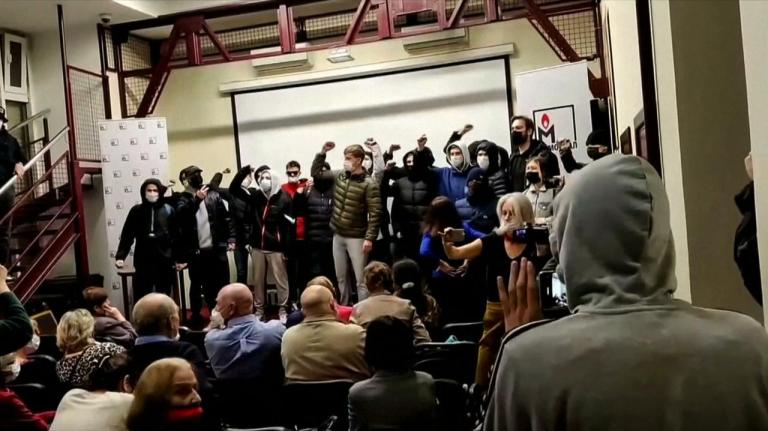A large group of masked men interrupted and threatened participants at a screening in Moscow of Polish director Agnieszka Holland’s film Mr Jones. The event was co-organised by the Polish Cultural Institute and hosted at the office of Russian NGO Memorial, which has been branded a “foreign agent” by the Kremlin.
The film tells the story of Gareth Jones, a real-life journalist who exposed the 1932-33 famine known as the Holodomor in which millions of Ukrainians died. Ukraine regards the episode as a genocide resulting from deliberate Soviet policies. A number of other countries, including Poland and Canada, have also recognised it as such.
Fifteen minutes into the screening yesterday, around 30-35 young men in masks broke in and began shouting insults and orders in front of the screen, according to Irina Ostrovskaya, a representative of Memorial. She described the men as “titushky”, meaning hired hooligans.
The intruders shouted “Scum!”, “Fascists!” “Get out of Russia!”, and “There’s no room for foreign agents!”, Ostrovskaya said. They also ordered the people watching the film, many of whom were elderly, to lie on the floor.
After some time, the men fled the scene, but Memorial staff prevented three of them from escaping, and they were detained when the police arrived, she said.
😡 😡 😡 Un événement organisé dans les locaux de @hrc_memorial & @MemorialMoscow interrompu un groupe d’individus inconnus. Video Gleb Strunnikov pic.twitter.com/HAHtMlMfFl
— Memorial France (@france_memorial) October 14, 2021
The screening was legal and had received the necessary permit from the culture ministry, Ostrovskaya noted. “It is absolutely an anti-war film”, she added, saying that she did not know who had organised the attack.
“We are in touch with the organisers and monitoring the issue,” tweeted Łukasz Jasina, the spokesman for Poland’s foreign ministry, in response to the intrusion.
In a subsequent statement, the ministry added that the police carried out checks on the people in the room for several hours and no Polish citizen was physically harmed.
Po wtargnięciu na pokaz filmu OBYWATEL JONES Agnieszki Holland organizowany przez @PLInst_Moskva w siedzibie @MemorialMoscow pozostajemy w kontakcie z organizatorami i monitorujemy sprawę https://t.co/3fRhxk0bLp
— Łukasz Jasina (@RzecznikMSZ) October 15, 2021
“The attack on the headquarters of an important organisation for Polish-Russian relations and historical memory is another extremely sad example of the treatment of an institution dealing with historical memory,” the statement continued. The ministry vowed to take “appropriate action”.
The screening of the film, winner of the Grand Prix Golden Lions at the 2019 Gdynia Film Festival and selected to compete for the Golden Bear in Berlin the same year, was due to be followed by a discussion featuring Piotr Skwieciński, the director of the Polish Institute in Moscow.
Mr Jones shows the ambitious young journalist receiving official permission to travel to the Soviet Union, where he hopes to interview Stalin, but absconding from Moscow to Ukraine, where he discovers evidence of the famine, which he later shares in Britain.
“The world is aware of the Nazi crimes against humanity but people don’t know – and don’t want to know, really – about the communist crimes,” Holland told Forbes when her film was released.
“The victims have been forgotten, and this is bad for the future because we are not learning the lessons from the mechanics of those crimes,” she added. “If we don’t think about it…it can come back …very easily. We can see it in Russia today that some of those mechanics are coming back.”
Poland and Russia have been involved in a number of disputes over history in recent times, with Vladimir Putin and other Russian officials seeking to downplay Soviet responsibility for the invasion of Poland in 1939 and subsequent crimes against ethnic Poles.
Main image credit: Twitter screenshot

Ben Koschalka is a translator, lecturer, and senior editor at Notes from Poland. Originally from Britain, he has lived in Kraków since 2005.




















